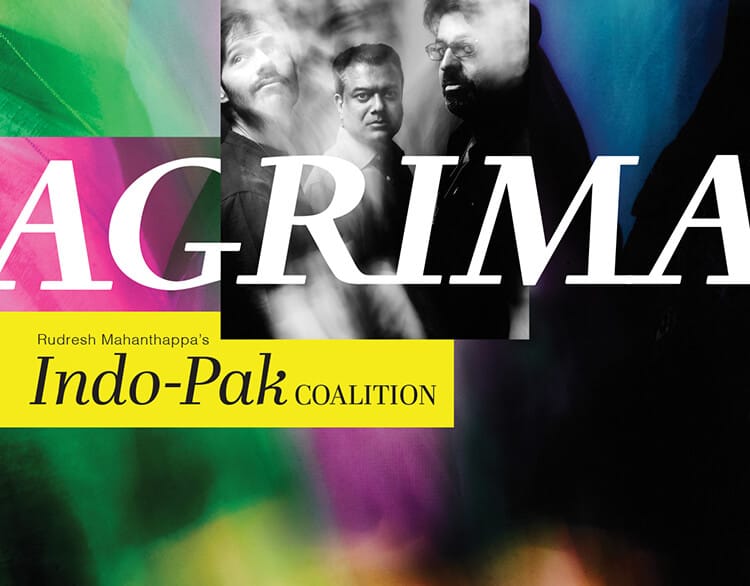Unfiltered Universe and Agrima
New Jazz releases reviewed
Share Article
As a developing jazz musician in Boulder, Colorado, alto saxophonist Rudresh Mahanthappa had little in the way of South Asian role models. In time he encountered pianist and kindred spirit Vijay Iyer of Rochester, New York, and the two began to engage with their identity and cultural inheritance in a deeper way through their art.
Later, in New York, Mahanthappa struck up an alliance with Rez Abbasi, a Karachi-born guitarist raised in southern California. They worked with Carnatic saxophone master Kadri Gopalnath in Mahanthappa’s acclaimed Kinsmen project. And together with drummer Dan Weiss (a diligent tabla student under Pandit Samir Chatterjee), Mahanthappa and Abbasi formed a trio, the Indo-Pak Coalition, merging Indian rhythmic elements and performance practices with the improvisational fire of jazz at its most modern. They released the vivid and technically brilliant Apti in 2008.

With Agrima (Sanskrit for “next”), the Indo-Pak Coalition makes its long-awaited return. The album finds Mahanthappa, Abbasi and Weiss expanding their sonic vision with computer effects and a new tabla/drum kit hybrid of Weiss’s devising that heightens the music’s dynamic range and rhythmic drive.
On Apti, with the pervasive ring of the tabla (and sometimes acoustic guitar), the music was more explicitly Indian in approach. Agrima uses tabla as well, and the opening “Alap,” a slow, out-of-tempo drone improvisation, summons the sound of Indian music right away. But Weiss often switches to a more conventional drumset approach as the pieces evolve. Abbasi’s guitar takes on a heavier, more rock-like sound, particularly on “Snap.” Odd and otherworldly software-generated sounds emerge on “Kaw,” “Revati,” “Eeeeee” and elsewhere. Genre boundaries fall away as the trio takes a bolder step toward its own musical language. The performances are virtuosic, at times breathtakingly so, full of precision yet sometimes slightly wild.
An ambitious bandleader who has traveled to India to study with the great Ustad Alla Rakha, Abbasi formed his Invocation quintet around the same time as the Indo-Pak Coalition. He enlisted Mahanthappa, Iyer and Weiss as core members and released Things to Come in 2009, focusing on the influence of Hindustani music. He followed up in 2011 with the Qawwali-inspired Suno Suno (“listen listen” in Urdu). On Unfiltered Universe, the new album, Abbasi grapples with the Carnatic musical tradition of south India, where Mahanthappa and Iyer have family roots.
Not unlike Agrima, Unfiltered Universe takes the interactivity of jazz as a starting point but looks to Carnatic music as a wellspring of ideas. There is less explicit reference to Indian instrumentation or formal structure than one hears from Indo-Pak. But it’s there, whether in the formidably complex cyclical rhythms or in subtle details of phrasing and ornamentation.
Invocation is also a larger group than Indo-Pak. Bassist Johannes Weidenmueller covers a deeper register while newly recruited cellist Elizabeth Mikhael brings a wealth of possibility in terms of rich counterpoint and a singing legato tone, distinguishing Unfiltered Universe from its predecessors. The beats can verge on funky: the closing “Dance Number” gets its name for good reason, and the fractured asymmetric meters of “Propensity” and “Thin-King” have a kind of physical intensity. But the more restrained title track, with glowing harmony that prompts the most lyrical soloing of the session, adds a measure of warmth and introspection.

There’s something visceral and gripping about the speed and urgency of Mahanthappa’s horn, the endlessly fluid articulation of Abbasi’s guitar: these are among the most identifiable and consequential voices in jazz of the last two decades. Interestingly, in their respective quests they land at one particular place that is arguably similar: the odd backwards-sounding effect that Mahanthappa conjures at the start of “E” on Agrima finds its analogue in Abbasi’s solo-guitar interlude “Thoughts” on Unfiltered Universe. Though this quivering, unsettled sound leads them toward different musical conclusions, it suggests a likeminded spirit, a shared commitment to addressing the musical past, present and future on their own terms.

Agrima
Rudresh Mahanthappa - alto saxophone, electronics;
Rez Abbasi – guitar, electronics; and
Dan Weiss – tabla, drums
2017. Self Produced.
Listen: Snap

Unfiltered Universe
Rez Abbasi – guitar;
Vijay Iyer – piano;
Rudresh Mhanthappa – alto saxophone;
Johannes Weidenmueller – double bass;
Dan Weiss – drums; and
Elizabeth Mihael – cello
2017. Whirlwind Recordings Ltd.










